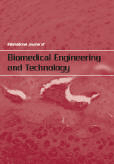
BME Frontiers
Scope & Guideline
Connecting Ideas to Impact in Biomedical Engineering
Introduction
Aims and Scopes
- Biomedical Imaging and Sensing:
The journal emphasizes advancements in imaging modalities and sensing technologies, including novel applications of optical, ultrasound, and photoacoustic imaging for diagnostic and therapeutic purposes. - Nanotechnology in Medicine:
A significant focus on the design, application, and efficacy of nanomaterials and nanoparticles in drug delivery, cancer therapy, and combating antimicrobial resistance, reflecting the growing importance of nanotechnology in healthcare. - Artificial Intelligence and Machine Learning:
The integration of AI and machine learning techniques in medical diagnostics, imaging analysis, and healthcare solutions is a key area of research, showcasing the journal's commitment to leveraging technology for improved patient outcomes. - Tissue Engineering and Regenerative Medicine:
Research on tissue engineering, including bioreactors, scaffolds, and organoids, is prevalent. This area explores the development of functional tissues for transplantation and repair. - Drug Delivery Systems:
The journal features studies on innovative drug delivery methods, including stimuli-responsive systems and targeted therapies, particularly for cancer treatment and chronic conditions. - Clinical Applications and Health Technologies:
BME Frontiers addresses the translation of engineering innovations into clinical practice, focusing on technologies that enhance healthcare accessibility, diagnostics, and therapeutic interventions.
Trending and Emerging
- Functional Neural Interfaces:
Recent papers indicate a growing interest in functional neural networks and interfaces, particularly in the context of brain organoids and targeted therapies for neurological disorders. - Smart and Responsive Drug Delivery Systems:
Innovative drug delivery platforms that utilize smart materials and nanotechnology for controlled release and targeted action are increasingly prominent, showcasing the journal's focus on precision medicine. - AI-Driven Healthcare Solutions:
There is a marked increase in research exploring AI applications in healthcare, particularly for diagnostics, imaging analysis, and personalized treatment plans, reflecting a broader trend towards digital health. - Multimodal Imaging Techniques:
Emerging trends highlight the integration of multimodal imaging techniques that combine different imaging modalities to enhance diagnostic capabilities and therapeutic monitoring. - Sustainable Biomedical Materials:
Research on biodegradable and bioresorbable materials for medical applications is gaining momentum, emphasizing the need for sustainable practices in biomedical engineering.
Declining or Waning
- Traditional Biomedical Devices:
Research centered around conventional biomedical devices, such as basic diagnostic equipment, appears to be declining as the focus shifts towards more advanced, integrated technologies. - Basic Biological Studies:
Papers that delve deeply into basic biological mechanisms without a clear engineering or application perspective are less frequently published, indicating a trend towards more applied research. - Static Imaging Techniques:
There is a noticeable reduction in the exploration of static imaging techniques as dynamic and real-time imaging modalities gain more attention in the context of biomedical applications. - Invasive Surgical Techniques:
Research focusing on traditional invasive surgical methods is waning, possibly as minimally invasive and non-invasive techniques are preferred due to their lower risk and better patient outcomes. - Conventional Drug Formulation Studies:
Studies centered solely on conventional drug formulation without the integration of novel delivery technologies or nanotechnology are becoming less frequent in the journal.
Similar Journals

International Journal of Biomaterials
Shaping the future of healthcare with open access to biomaterials research.The International Journal of Biomaterials, published by HINDAWI LTD, is a premier platform for disseminating groundbreaking research in the fields of biomaterials and biomedical engineering. With an Open Access approach since 2009, this journal provides unhindered access to innovative studies and applications aimed at advancing medical technologies and improving patient outcomes. Notably ranked in the Q3 category for both Biomaterials and Biomedical Engineering in 2023, it serves as an essential resource for researchers, practitioners, and students alike. The journal's Scopus rankings, including a 49th percentile in Biomedical Engineering and a 40th percentile in Biomaterials, further underscore its growing prominence in the academic community. With contributions spanning from 2011 to 2024, the journal seeks to foster collaborative research and promote developments that enhance the understanding and application of biomaterials in healthcare.

Bioengineering & Translational Medicine
Transforming Research into Real-World SolutionsBioengineering & Translational Medicine, published by WILEY, positions itself at the forefront of innovation in the fields of biomedical engineering, biotechnology, and pharmaceutical science. With an impressive impact factor reflected through its top-tier Q1 rankings in multiple categories, the journal serves as a critical platform for disseminating cutting-edge research and stimulating discourse among professionals and scholars since its establishment as an open-access journal in 2016. Key to its mission is facilitating the translation of bioengineering research into tangible medical applications, thereby enhancing healthcare outcomes. With its comprehensive scope, it attracts a diverse readership, including researchers, industry leaders, and students eager to engage with the latest developments in translational medicine. The journal operates under robust access options, ensuring that research is freely available for maximum reach and impact, fostering collaboration and innovation across disciplines worldwide.

International Journal of Biomedical Engineering and Technology
Bridging Disciplines for Tomorrow's Medical BreakthroughsThe International Journal of Biomedical Engineering and Technology, published by INDERSCIENCE ENTERPRISES LTD, serves as a pivotal platform for the dissemination of innovative research in the field of biomedical engineering. This journal, with ISSN 1752-6418 and E-ISSN 1752-6426, has been a valuable resource since its inception in 2007, boasting a converged publication timeline extending to 2024. Based in the United Kingdom, the journal aims to bridge the gap between engineering and biomedical sciences, facilitating interdisciplinary collaboration. As reflected in its 2023 Scopus ranking in the Q4 quartile of Biomedical Engineering, the journal remains accessible for researchers at various stages of their careers, contributing to its significance in promoting advancements in healthcare technologies. While currently not an open-access publication, the journal remains dedicated to enriching the biomedical engineering community by presenting novel research that addresses critical challenges, ultimately aiming to improve patient outcomes and drive innovation in medical devices and therapies.

Progress in Biomedical Engineering
Pioneering advancements at the intersection of medicine and technology.Progress in Biomedical Engineering, published by IOP Publishing Ltd, is a premier open-access journal that serves as a vital platform for the dissemination of innovative research in the field of biomedical engineering. With an impressive Q1 classification in the Biomedical Engineering category for 2023, this journal has established itself as a significant contributor to the advancement of engineering solutions that improve healthcare outcomes. Recognized for its high-quality and impactful publications, it ranks 51st out of 303 in its field on Scopus, placing it in the 83rd percentile. The journal aims to foster interdisciplinary collaboration and introduce pioneering methodologies and technologies that bridge the gap between engineering and medicine. By providing a pathway for rapid communication of fundamental and applied research, Progress in Biomedical Engineering is dedicated to shaping the future of healthcare technology. Access to its content ensures that researchers, professionals, and students remain at the forefront of biomedical innovation.

Physical and Engineering Sciences in Medicine
Innovating Solutions at the Intersection of Science and MedicinePhysical and Engineering Sciences in Medicine is an esteemed peer-reviewed journal published by SPRINGER, dedicated to advancing the interdisciplinary fields of biomedical engineering and biophysics. With an ISSN of 2662-4729 and an E-ISSN of 2662-4737, this journal has carved a niche for itself since its inception in 2020. Situated in the Netherlands, it serves as a global platform for innovative research and developments that bridge the physical sciences and engineering with medical applications. The journal boasts a commendable range of quartile categorizations, highlighting its impact in various sectors including Instrumentation (Q1), Radiology (Q2), and Biotechnology (Q2). Its Scopus rankings further emphasize its relevance and quality, placing it in the top 15% in several categories. Being an Open Access title, it promotes the dissemination of knowledge, ensuring that vital research is accessible to all, thereby fostering collaboration among researchers, professionals, and students alike. The journal's objectives include promoting cutting-edge research, enhancing biomedical technology, and addressing complex health challenges through innovative engineering solutions, establishing it as a vital resource in the scientific community.

Bioengineering-Basel
Unlocking Potential in Bioengineering ResearchBioengineering-Basel, an esteemed journal published by MDPI, stands at the forefront of innovation in the field of bioengineering since its inception in 2014. With an E-ISSN of 2306-5354, this fully Open Access journal based in Switzerland provides a platform for researchers and professionals to disseminate cutting-edge findings across various aspects of bioengineering, including biomaterials, tissue engineering, and biopharmaceuticals. The journal has been recognized with a Q3 ranking in the 2023 Bioengineering category, reflecting its commitment to quality and relevance. By facilitating widespread accessibility to academic knowledge, Bioengineering-Basel aims to foster collaboration and stimulate thought leadership within the global research community, making it an indispensable resource for students, scholars, and industry practitioners alike.

Biomedical Engineering Letters
Advancing biomedical innovation through shared knowledge.Biomedical Engineering Letters, published by SpringerNature, is a prominent journal in the field of Biomedical Engineering. With a robust ISSN of 2093-9868 and E-ISSN of 2093-985X, this esteemed journal has established itself as a vital resource for researchers and professionals seeking to advance their knowledge and share groundbreaking findings. Recognized for its quality, Biomedical Engineering Letters holds a distinguished ranking in Scopus, positioned at #94/303 (69th percentile) in the Biomedical Engineering category. The journal covers a diverse scope within biomedical engineering, providing an important platform for innovative research from 2011 to 2024 and facilitating the exchange of ideas among scholars. Although it operates under a subscription model, the journal's commitment to enhancing the field makes it an indispensable reference for those engaged in cutting-edge biomedical research in Germany and globally.

BIOMEDICAL MICRODEVICES
Unleashing Potential in Biomedical MicrodevicesBIOMEDICAL MICRODEVICES is a leading journal published by Springer that focuses on the innovative field of microdevices within biomedical engineering. With an ISSN of 1387-2176 and an E-ISSN of 1572-8781, BIOMEDICAL MICRODEVICES offers a prestigious platform for researchers to disseminate their findings from 1998 to 2024, demonstrating a long-standing commitment to advancing knowledge in this critical area. The journal is recognized for its significant contributions, boasting a Q2 ranking in Biomedical Engineering and Nanoscience and Nanotechnology, and a Q3 rank in Molecular Biology. Renowned for its rigorous peer-review process, it is positioned within the top 30% of its field according to Scopus rankings, making it a valuable resource for researchers and practitioners alike. Though it operates under a subscription model, the emphasis on quality and relevance within its scope ensures that BIOMEDICAL MICRODEVICES remains a vital source of cutting-edge research that bridges engineering and biological systems, fostering innovation and collaboration in the pursuit of novel health solutions.

Biomedical Engineering-Biomedizinische Technik
Bridging Disciplines for Revolutionary Biomedical SolutionsBiomedical Engineering-Biomedizinische Technik, published by WALTER DE GRUYTER GMBH, serves as a pivotal platform for advancing knowledge in the field of biomedical engineering and medicine since its inception in 1956. With an ISSN of 0013-5585 and an E-ISSN of 1862-278X, this peer-reviewed journal offers accessible insights into innovative research and technological advancements that are reshaping healthcare practices and biomedical applications. Although rated in the Q3 category for both Biomedical Engineering and Miscellaneous Medicine in 2023, the journal's impact factor and growing reputation demonstrate its vital role in fostering academic dialogue and collaboration. The journal is based in Germany, while its scope encompasses a diverse range of topics, thus bridging the gap between engineering and medical disciplines. Researchers, professionals, and students alike are encouraged to engage with the content that not only highlights contemporary challenges but also presents groundbreaking solutions in biomedical technology.

Biomedical Materials
Transforming Science into Life-Saving Solutions.Biomedical Materials, published by IOP Publishing Ltd, is a premier journal dedicated to the rapidly evolving field of biomedical engineering and materials science. With a robust impact factor showcasing its influence, this journal serves as a vital platform for disseminating pioneering research from 2006 to 2024. Covering an array of interdisciplinary topics—ranging from biomaterials to bioengineering and applied chemistry—the journal consistently ranks in the second quartile across multiple categories including Bioengineering (Q2), Biomaterials (Q2), and Biomedical Engineering (Q2) as of 2023. Researchers, professionals, and students alike benefit from its contributions, exploring innovative solutions at the intersection of biology and material science. Although not an Open Access journal, Biomedical Materials remains essential in advancing our understanding and facilitating discussions surrounding state-of-the-art materials that revolutionize medical applications and enhance patient care.